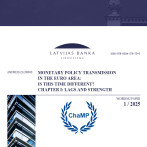Money supply growth slowing down
After a seasonal drop a rise in money supply resumed in February, yet this rise was quite substantially moderated by the background of decisions related to budget consolidation and global developments. It was a reflection of the current situation in the Latvian economy where recovery is continuing yet a trend toward slower development is becoming apparent - the rise in demand for cash currency was also low. As deposits in foreign currencies continued to grow, the total balance of deposits attracted by banks rose slightly, yet the total bank loan portfolio continued to contract at the same time.
Money indicator M3, which characterizes the amount of cash and non-cash currency in the economy, grew by 0.8% in February, yet as a result of base effect, the annual rate of M3 growth dropped to 10.0%. The rate of annual growth of bank-attracted deposits and cash currency in circulation registered a similar drop at 7.8% and 19.4% respectively. The M3 increase resulted from the still rapid growth of overnight deposits, with the balance of deposits with an agreed maturity and deposits redeemable at notice shrinking. Although the deposits of both enterprises and households were slightly on the rise in February, their dynamic differed by currency. The still strong export indicators accounted for the substantial rise in enterprise euro deposits while the low domestic demand and caution shown by the population in spending, which resulted in stagnating retail, led to a drop in enterprise and growth in household lats deposits.
The domestic loan balance contracted by 1.1% in February and the annual rate of lending decrease reached -8.7%. The drop was primarily determined by the gradual reduction in the balance of euro loans granted to businesses and households, whereas the balance of lats loans granted to businesses grew for a fourth consecutive month thus bringing up the still slight proportion of lats loans in the bank loan portfolio.
The low growth of money indicators and the unchanging situation in lending fails to cause much optimism to the near future outlook. Even though Latvia has lately received international approval, that has resulted in a positive future outlook for credit rating and an elevation of the rating itself, the growing tax burden and inflation domestically and the turbulence caused by political developments and natural catastrophes in many parts of the world will encourage lower consumption and increased deposits also in Latvia. Albeit ensuring stability in the banking sector by promoting a moderate increase in money supply in the coming months, it will not stimulate overall economic growth. To achieve sustainable growth of the Latvian economy it is of utmost importance to conclude the budget consolidation process not with tax hikes, which slow competitiveness and promote inflation, but with real structural reforms and cuts in budget expenditure.
Textual error
«… …»






